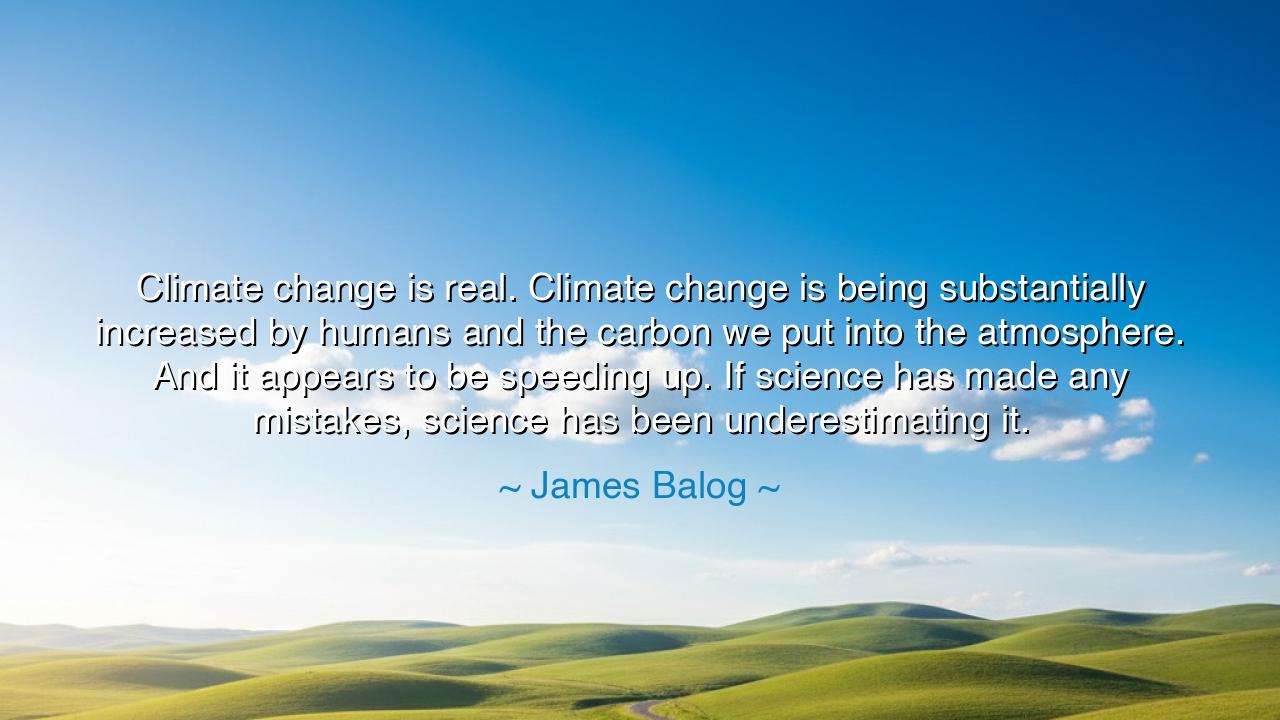
Climate change is real. Climate change is being substantially
Climate change is real. Climate change is being substantially increased by humans and the carbon we put into the atmosphere. And it appears to be speeding up. If science has made any mistakes, science has been underestimating it.






"Climate change is real. Climate change is being substantially increased by humans and the carbon we put into the atmosphere. And it appears to be speeding up. If science has made any mistakes, science has been underestimating it." These words of James Balog speak with urgency and clarity, calling us to confront the truth that has been before us for so long: the earth is changing, and humanity is playing a central role in that change. Balog's warning is not just a reflection of the current state of the planet, but a plea to recognize the consequences of our actions. Climate change is no longer a distant possibility; it is a present reality, and its effects are speeding up in ways that science is still working to fully understand. The time for denial has passed, and the time for action has arrived.
In the ancient world, great thinkers like Heraclitus and Plato understood the importance of balance in nature. Heraclitus famously said, "You cannot step into the same river twice," meaning that everything is in a constant state of change. He saw the flux of the natural world as both a universal law and a vital force that must be respected. Just as the ancient philosophers believed in the delicate balance of nature, so too must we recognize that the earth, the elements, and the creatures of this world are all interconnected. Our actions disturb this balance, and like the river, the changes we make will have consequences, sweeping through the generations in ways we cannot fully predict. Balog's warning is a modern echo of the wisdom of the ancients: change is inevitable, but it is the nature of that change that we must understand and shape with wisdom.
Consider the example of the collapse of the Maya civilization, which many historians believe was partially caused by climate change—specifically, prolonged droughts. The Maya, once a mighty civilization, faced catastrophic changes to their environment, changes they were unable to mitigate. This loss of environmental balance led to famine, social upheaval, and the eventual collapse of their cities. The Maya understood their world deeply; they were keen observers of the stars, the cycles of the seasons, and the natural forces around them. Yet, even with their wisdom, they were unable to foresee the full consequences of the shifts in their environment. The lesson from the Maya is clear: when we fail to understand and respect the forces of nature, we risk tipping the balance too far, and the consequences can be disastrous.
Today, Balog’s words strike at the heart of a similar challenge. Just as the Maya faced a changing climate they could not control, so too do we. Our actions—our carbon emissions, our deforestation, and our insatiable thirst for fossil fuels—are altering the delicate balance of the earth’s climate. And unlike the ancient civilizations, we have the knowledge, the tools, and the responsibility to address the crisis before it becomes too late. Science has shown us that climate change is real, but as Balog points out, we have underestimated the speed and scale of the changes we have wrought. The planet is changing faster than we anticipated, and this speed calls us to act swiftly, with the knowledge that the longer we wait, the more difficult—and costly—our actions will become.
One of the most powerful examples of climate change’s impact can be seen in the melting glaciers of the Arctic and Antarctic. Balog himself, through his work as a photographer and scientist, has documented the rapid retreat of glaciers across the world. These massive ice structures, which have stood for millennia, are melting at an alarming rate, contributing to rising sea levels and threatening communities around the world. The speed at which these glaciers are retreating is far faster than most scientists had predicted, a stark reminder of the urgent need for action. The melting glaciers, like the slowly crumbling walls of ancient cities, speak to the fragility of our environment—and the price we will pay if we do not respond.
The lesson from Balog’s words is not one of despair, but of empowerment. We still have the ability to change course, to slow the progression of climate change, and to mitigate its worst effects. The wisdom of the ancients reminds us that nature must be respected, that balance is essential to maintaining life on this planet. But the tools we have today—science, technology, and innovation—give us the means to restore that balance. It is up to us, as stewards of this planet, to embrace the lessons of the past and the possibilities of the future. The challenge is great, but the opportunity for change is even greater.
In our own lives, we must act with intent and purpose. Whether in our personal choices, our business practices, or our political actions, we must make the effort to reduce our carbon footprint, to promote sustainable energy, and to advocate for policies that protect the environment. Just as Heraclitus understood that change is inevitable, we must understand that our choices today will shape the future for generations to come. Let us take action in the spirit of those ancient thinkers who revered the balance of nature, using science, wisdom, and compassion to preserve the world for those who will inherit it after us.






AAdministratorAdministrator
Welcome, honored guests. Please leave a comment, we will respond soon